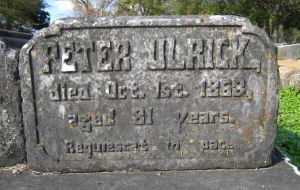In the June 13, 1919, edition of the New Orleans States, the paper had a bold headline detailing a crisis that was sweeping Beauvoir veteran’s home on the Mississippi Gulf Coast:
NO CHEWING TOBACCO; NO CIVIL WAR STORIES
The States went on to relate that “Because the maintenance fund of the home is not sufficient, Confederate veterans at the Beauvoir home cannot swap war reminiscences unless they have more chewing tobacco.”
Intrigued by the tale of this calamity that swept Beauvoir in the spring of 1919, I did a little digging and found a more detailed story of the problem in The Southern Advocate (Benton County, Mississippi), June 19, 1919:
VETERANS NEED TOBACCO
Biloxi, Miss., June 11, 1919
Editor The Commercial Appeal
My appropriation for maintaining the Confederate veterans at the Jefferson Davis Soldiers Home at Beauvoir, Miss., is so small that I am forced to put the old veterans on very small tobacco allowance. If there is anything an old Confederate veteran loves and enjoys it is his pipe and his chewing tobacco. I am doing everything possible to keep them in tobacco. I have made appeals to the public for tobacco for them and am getting some responses.
Mr. W. M. Lampton of Magnolia has sent us 100 pounds of chewing tobacco and we have received quite a number of small packages from various parts of Mississippi and Louisiana, but I am afraid that not many people read my appeal for tobacco and I am going to ask you to write an appeal and ask everybody in Mississippi who uses tobacco to send me just one plug or just one package of plug cut by parcel post. This won’t hurt anybody’s purse and I feel certain that every tobacco user will only be too glad to divide his tobacco with an old Confederate veteran.

Mr. L. K. Salsbury, president of the Mississippi Pine Land and Delta Company of Memphis, has written to know what are the

favorite brands of tobacco. We replied Brown’s Mule and George Washington. You will certainly be conferring an everlasting favor by writing an appeal in your paper for tobacco for the old veterans at Beauvoir. thanking you very much for this kindness in advance, I beg to remain, yours very truly,
E. Tartt, Superintendent
In yet another article about the great tobacco shortage from the Times-Picayune (New Orleans), May 31, 1919, I found more detailed information about the cause of the problem:
Mr. Tartt makes this appeal because the institution is short of funds, due to the small appropriation by the Legislature, which allowed only 60 cents a day for each person in the home. The advance in prices since the appropriation was made by the legislature in March, 1918, has placed the institution in an embarrassing financial condition, and the management has found it difficult to make both ends meet. Out of an allowance of 60 cents a day for each inmate the superintendent mush furnish clothing, medicine, fuel and all other necessaries, and in addition must give each veteran $2 per month in cash for pocket money.
The call put out by Elnathan Tartt for tobacco met with a positive response from the general public. The Beauvoir Chapter of the United Daughters of the Confederacy voted to donate $5 to the home to buy tobacco for the veterans. As stated above, the largest single benefactor of the Beauvoir veterans was Walter M. Lampton, who sent the veterans 100 pounds of tobacco. Lampton, a businessman from Magnolia, Mississippi, greatly admired the old soldiers, and often sent them food, drink, and other items to make their stay at Beauvoir more pleasant.
A cursory search in the GenealogyBank newspaper archive turns up story after story of the generosity of Walter M. Lampton: the

December 20, 1921 edition of the Gulfport Daily Herald noted that he had offered to replace the wooden headboards in the Beauvoir cemetery with cement headstones, so that the graves would never be unmarked; in the May 29, 1922 edition of the Times-Picayune (New Orleans), the paper noted that Lampton had pledged to pay ten percent of the total donations made to Beauvoir in the campaign to build a $100,000 hospital on the grounds.
Walter M. Lampton died on December 11, 1930, at his summer home, which was near the Beauvoir veteran’s home. In his obituary it was said of him, “Enjoyment of residence near Beauvoir Soldiers Home and friendship with the inmates there were predominating influences in his life during the past decade. He knew every man and woman at Beauvoir and all counted for him their friend. He attended 32 Confederate Reunions, state and general, and was known through America for his interests in the ‘old soldiers.’ When his health permitted no day passed that he did not visit Beauvoir. Not a casual interest but the type of friendship and desire for the happiness of the old soldiers that caused him on numerous occasions to loan the home funds to operate [while] awaiting legislative appropriation, actuated Mr. Lampton.” – Daily Herald (Biloxi, Miss.), December 11, 1930.
The body of Walter M. Lampton was taken by train back to Magnolia, where the body was interred by the family. The Daily Herald noted “The Confederate flag at Beauvoir was at half mast all day in respect to Mr. Lampton.” It was a last tribute to a man who had spent much of his life and fortune helping others.



